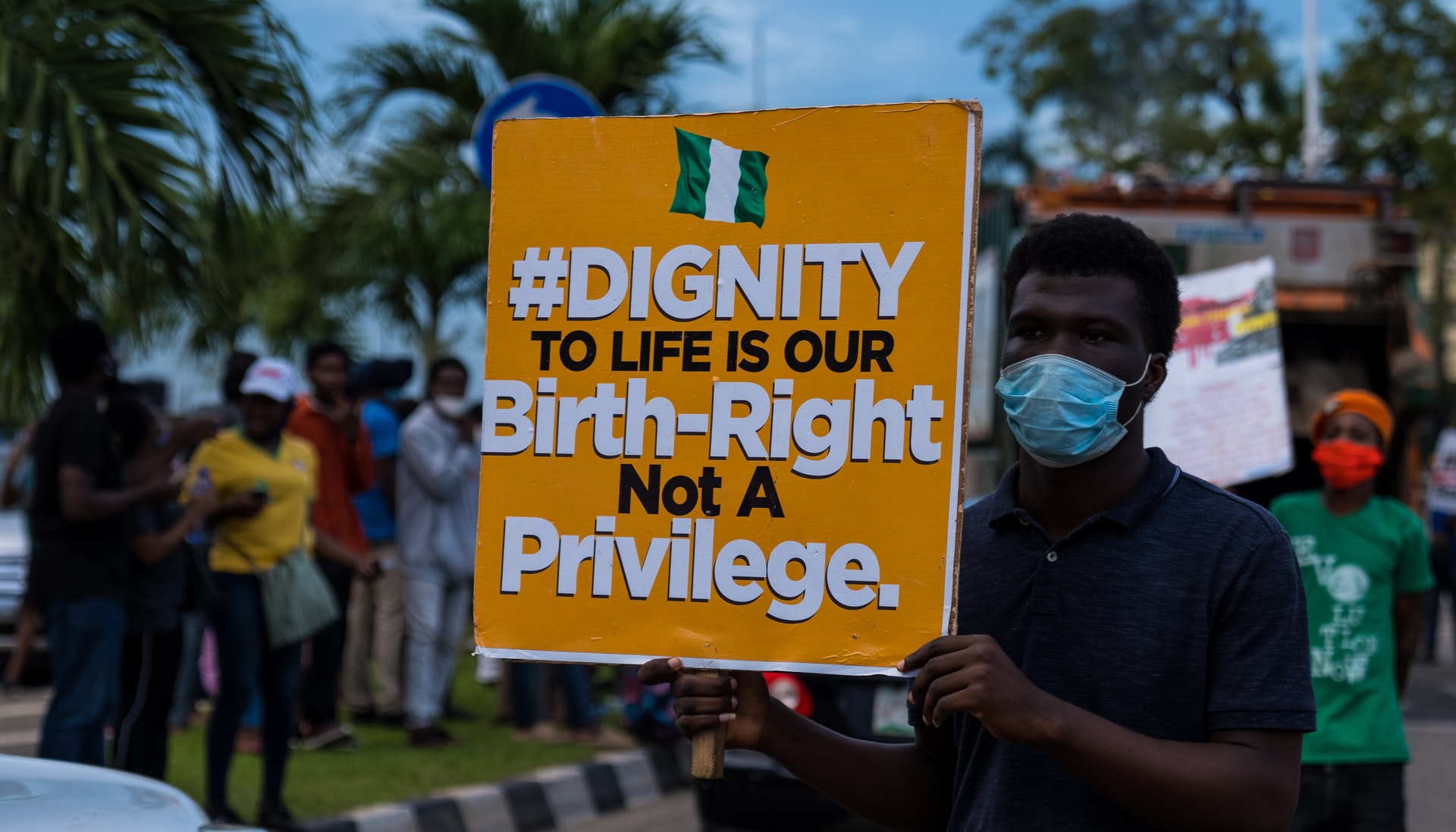In a video that surfaces after the incident, military officers arrive at the Lekki Toll Gate on the Lagos island, stand for a moment in front of a group of protesters separated by a line of road barricades sitting and singing the national anthem in the darkness that envelopes an ordinarily lit location, and begin shooting, not in the air, but into the group.
October 20, 2020 marked a turning point in the #EndSARS protests that spread widely across Nigeria in the month of October over police brutality particularly by the Special Anti-Robbery Unit of the force.
Over the course of the protests, it also became a cry for good governance driven by a particularly young crop of Nigerians eager for improved conditions of living, governance and economic prospects for the country.
The chilling events of that day, streamed Live by musician, DJ Switch, who was at the tollgate on the night of the incident has remained a contentious topic that has gradually unfolded and for which protesters and the international community are demanding restitution be made.
In an address two days after the incident, President Muhammadu Buhari said the government had listened to calls by protesters to #EndSARS and had disbanded the group promptly but this “seemed to have been misconstrued as a sign of weakness and twisted by some for their selfish unpatriotic interests”.
He went on to say the protests had been allowed to turn violent in spite of efforts the government has made to ensure the “well-being and welfare of citizens”. His speech drifted into a litany of small and medium-scale empowerment initiatives but failed to mention nor address the events of Tuesday, October 20 to the great disappointment of many.
Veracity of events of the night
Since October 20, 2020, both the Lagos state government and the Nigerian military have continued to point fingers at each other about who gave the orders to orchestrate what went on at the Lekki toll gate on that night.
The Nigerian military initially said its men were not at the toll gate and branded accounts from local and international media organisations as fake news on its Twitter account.
The Lagos state governor had also denied that there were fatalities on national television and said the military’s rules of engagement were not under his control.
Investigations by Amnesty International put the military at the Lekki toll gate as do analyses of several video footage by the DFRLab. Amnesty International also confirmed that there were fatalities, one of which the over 100,000 viewers tuned into DJ Switch’s Live feed watched die while fellow protesters attempted to remove a bullet from his thigh holding up torchlight from their mobile phones. At least 12 people were confirmed dead the morning after.
More recently, an exhaustive investigation by CNN as well as findings from an ongoing Judicial Panel Hearing in Lagos now confirm that the military was indeed at the gate and that they fired at protesters although they claim to have used blanks and fired into the air and not at young armless Nigerians sitting on the floor and reciting the anthem.
Judicial panel inquiry
Judicial panels have been set up in a number of states in the government’s response to the #EndSARS protests. The hearings are supposed to investigate cases of human rights abuse by the SARS unit. So far, panels have been set up in 26 out of 36 states: Abia, Akwa Ibom, Adamawa, Anambra, Bayelsa, Bauchi, Benue, Cross Rivers, Delta, Edo, Enugu, Ebonyi, Ekiti, Gombe, Imo, Katsina, Kogi, Kwara, Lagos, Nasarawa, Osun, Ogun, Ondo, Plateau, Rivers, and Taraba.
In Lagos, the hearing is also investigating the night of October 20, 2020 in addition to cases of abuse and assault by the SARS unit. Filmmaker, Editi Effiong who has been attending these panels has been documenting each day’s activities via his Twitter account.
The outcome of these hearings is to ensure justice is served to victims of police brutality but it is unclear what forms this will take.
Walking targets
In spite of the set up of public hearings to look into grievances of #EndSARS protesters, targeted attacks towards the protest’s key figures remain. Earlier this month, accounts of some players in the protests were ordered to be frozen for a “period of 180 days pending the outcome of investigation and inquiry currently being conducted by the Central Bank of Nigeria”.
Modupe Odele who led legal efforts to free arrested and detained protesters for the duration of the protests had her passport confiscated on the 1st of November after which she was told she was under investigation. For what crime, she was never told until the passport was released nine days after following outcry on social media.
Social media also proved useful in putting pressure on the government to release Eromosle “Eromz” Adene a musician and philanthropist who was a prominent face at the protests on the Lagos mainland. Adene was picked from his home by unnamed police officers and would be later charged with criminal incitement, cyberstalking, provoking breach of public peace, and conduct likely to cause breach of peace.
There are reports that many more protesters who were arrested before the protests took a turn for the worse having been infiltrated by sponsored hoodlums, are still being held in cells across the country.
UK Parliamentary Hearing
On November 23, at the request of Nigerians in the UK to their representatives, the response of the government to the #EndSARS protests including the Lekki shooting were brought to the floor of the parliament during a hearing at Westminster Hall.
In a passioned speech, MP for Edmonton, Kate Osamor highlighted that the Nigerian government admitted it had continued to train and fund SARs units for the last four years, years in which it had said the unit had been disbanded. From 2016 till date, $10 million went into programs from which these units benefited. She asked the Minister to consider sanctions but also the ways in which the UK had been complicit in these turn of events and consider supporting and funding projects that are targeted at anti-corruption and economic alleviation more than anything else in the future.
More than 200,000 thousand people signed the petition that was brought before the house.
The parliament voted in favour of sanctions against key actors in the carnage of the last months.
“My plea to the minister today is that we stand with the young people of Nigeria who are demanding change far beyond the closure of SARS,” said MP for West Ham, Lyn Brown.
“I don’t think that words from the government today are going to be enough. Because I think we’ve got to show our solidarity, demonstrate it by identifying and targeting those that we know are responsible for the terrible violence and abuses that the activists have faced.”
“The least we should do is to make sure that those who have murdered Nigerians and deprived them of their human rights aren’t able to benefit from trade or travel to the UK.
“That should include the leaders of the government and the military who are even now refusing to allow transparent and fair investigations to happen and for justice to be implemented,” Brown said.
Also Read:




















